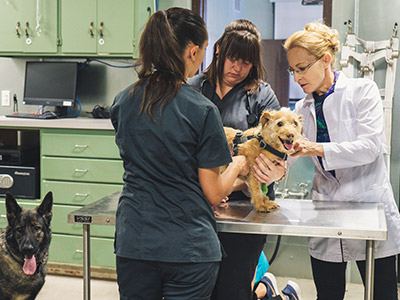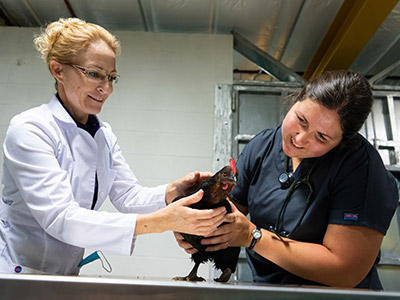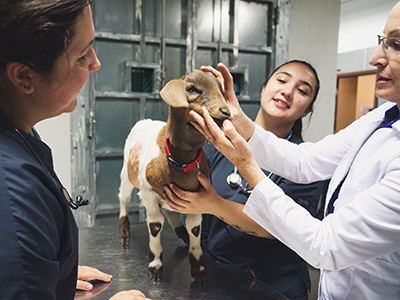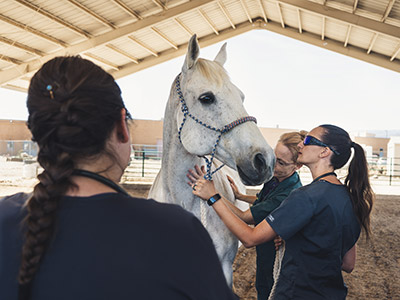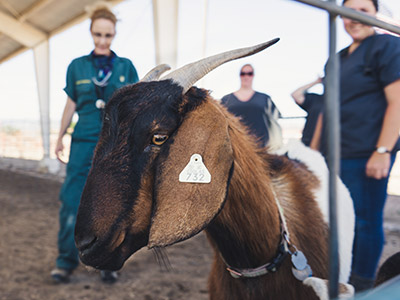Western Colorado Community College (WCCC) Veterinary Technology program students joined Amigo Animal Clinic staff and the Mesa County Sheriff's Posse, kicking off a new veterinary partnership in western Colorado. On Thursday, May 28, WCCC students and Amigo Animal Clinic staff hosted dogs, goats, chickens, kittens and a horse to mark the occasion.
Dr. Dominic Carrica, Amigo Animal Clinic owner, greeted students and animals alike as he welcomed the new Veterinary Technology program students for a facility tour and physical exam demonstration. Future veterinary technology training and clinical space for the program will be donated by Amigo Animal Clinic under the partnership.
"Having a combination of four and two legged friends today was a great way to kick off the new partnership,” said Carrica. “Veterinary professionals of all kinds are needed in the Grand Valley at all animal clinics and hospitals. Working with and supporting students from WCCC is a great way to build that future capacity.”
Current students performed checkups and wellness exams on a variety of animals Amigo Animal Clinic plans to provide use of clinical space, free of charge for student training. They will also provide job opportunities, program advisory services and classroom space.
Amigo Animal Clinic is only one of many area clinics supporting the WCCC Veterinary Technology program as students are currently completing clinical rotations at veterinary facilities across the Grand Valley. The program is also working closely with Roice Hurst Humane Society and Mesa County Animal Services.
At the partnership kickoff, students performed a number of demonstrations, including physical exams, anatomical comparisons, canine toenail trims and humane animal patient handling. The kickoff tour also included a short clinic on how to conduct a chicken health assessment by Dr. Anita Dennison, WCCC Veterinary Technology program director.
“Sometimes people think about traditional small animals when they think about a veterinary-related career,” said Dennison. “But a veterinary technician is really a lot like a nurse for animals. Through this career building program, graduates can work with a diversity of animals and work in everything from zoos to farms and ranches as well as traditional pet or exotic animal clinics.”
Located just two miles from the community college, Amigo Animal Clinic promises to be not only a strong partner, but also a convenient one for students.
Vice President for Community College Affairs Brigitte Sündermann helped envision and create the new partnership. She knows transportation can be a challenge for many students and is pleased that a large and comprehensive training facility is now available just a short distance from where students will receive classroom instruction.
“Students who love working with animals will be able to earn classroom credit hours and then conduct their clinical work without a lot of travel or hassle,” said Sündermann. “The support we have received from Amigo and the Sherriff’s Posse is taking our program to the next level.”
Sundermann and the Veterinary Technology faculty also recently celebrated a credentialing milestone as the program received accreditation from the Colorado Higher Learning Commission.
“We’ve done so much in the last two weeks, my brain is full,” said student Chelsea McCullough, as she reflected on recently completed coursework. She is working to complete the program that will culminate in an Associate of Applied Science in Veterinary Technology. The WCCC Veterinary Technology program is well on the way to American Veterinary Medical Association (AVMA) accreditation. Once this accreditation is achieved, graduates can sit for the veterinary technology board exam, the VTNE.
In April, WCCC Veterinary Technology students visited local farms and ranches. During these educational and service site visits, the aspiring veterinary technicians worked with local veterinarians and instructors to provide care for alpacas, cattle, horses, sheep, goats and dogs.
The program’s additional focus on large animals will be enhanced by another partnership agreement announced the same day. A collaboration with the Mesa County Sheriff’s Posse will allow WCCC use of the service club’s facilities located adjacent to WCCC. The Sheriff’s Posse owns and is making available the use of their riding arenas, holding pens, conference space and covered examination spaces for large animals.
“For more than 60 years the Mesa County Sherriff's Posse has served the community and has worked to preserve agricultural heritage,” said Sherriff’s Posse Board President Louis Polen. “Our relationship with Western Colorado Community College represents a new chapter in our community service, and we are pleased to support vet tech students who are very much needed to care for the animals and livestock throughout western Colorado.”
Catherine Whitney, technical instructor of veterinary technology, thinks that programs like 4H, Future Farmers of America and the WCCC Summer camp sessions all complement the program and are feeder programs for the vet tech degree.
“Some people believe that our Vet Tech program teaches loves for animals,” Dennison said. “But more often than not, we attract students who already love animals and want to the make the world better for them. In a way students who come to our summer camps or who come from programs like 4H can be a perfect fit.”
Students interested in the program can apply here.
Community members interested in providing scholarships for the program are encouraged to contact the CMU Foundation.
